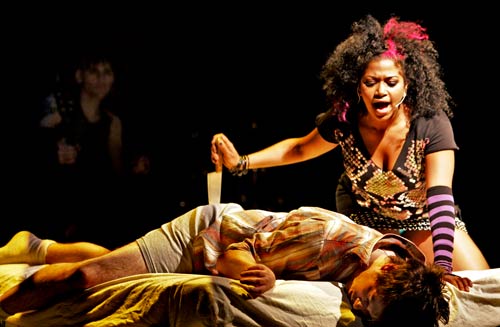It’s happened without fail: Every woman of a certain age we know who’s seen the musical American Idiot comes away with the same thought: They liked the show. They’ve all said as much, and so did we. But there is an unsettling thread running through it—and its source material—that’s tough to ignore: That straight, white American men kind of suck at life.
In a conversation about the show’s characters, an acquaintance summed it up: “One knocks up his girlfriend and is so depressed that he can’t get up off the couch. The other one becomes a drug addict. And the other one is so anger-filled that he goes to war and gets himself blown up.”
And scene? Really? This is a conundrum we’re not used to facing at the theater. Usually, the disturbing gender-related question at hand is why we’re being asked to embrace material that hates women (right at you, Mr. Sondheim, Mr. Mamet, Mr. LaBute…).
American Idiot poses a different quandary. In fact, it’s the women in American Idiot who come out stronger in the end. The Extraordinary Girl is Tunny’s grounded savior. Heather moves on. And even though Johnny dumps Whatshername, the event is played as the great mistake of his life—the thing he will always regret and wonder about. Johnny talks about his rage, but really, it’s Whatshername’s that seems justified and cathartic in the end. Hell, it even feels pretty good when Alysha Umphress’s character shoves Theo Stockman off the couch during “Too Much, Too Soon.”
It’s a disturbing portrait that we debated endlessly. Was this a bare-bones portrayal of reality, or just an over-explanation and justification of laziness, emotional weakness and really bad choices? Will’s acceptance of his young son in the show’s last scene is portrayed with fanfare—like we’re all supposed to applaud when this character does, you know, something that’s totally ordinary. And something that women are more-or-less expected and required to do.
In the end, though, we came down on the side of gritty realism. Because we see this dynamic reflected everywhere in our daily lives. We all know a Will, a Tunny or a Johnny—that guy who can’t get a job, or get through school, or get out of his own way. Some of us know one of each. They are the collateral damage of our crappy economy, or their own self-esteem issues, or some ephemeral other thing that keeps them stuck over there on the couch. Lots has been said about the slipping status of men in our society—but who knew that a musical—and one by Green Day—could crystalize things in such a complete way? This is part of American Idiot‘s uncomfortable greatness—the thing that’s making it a harder sell than almost anything on Broadway right now. Far from an escape, a respite from a bleak world, it asks its audience to look inward, and outward too. And if you’re a woman—one with a job, a family, a half-decent grip on reality—that look outward feels a little threatening. Especially when you realize that the guy in the seat next to you is kind of an idiot.
Photo: Parlour



{ 5 comments… add one }
Yes yes and YES! Thank you for pointing out that the women in AI are more than just candy stage props. And another reason to go see this show.
I hate this show and find all of the characters ridiculously underdeveloped (the female ones especially), but your point is interesting and probably one of the many reasons I don’t like the show: how do you sympathize with a protagonist who doesn’t DO anything? His race and sexual orientation only make him less sympathetic. It would be easy for Johnny and Will to make something of themselves but they don’t even try. They are static characters and it’s a static musical, full of futile screaming and literal running in place.
And while I agree that David Mamet’s work is aggressively, explicitly misogynistic, I don’t really agree about Neil LaBute’s. I think if anything he casts a more unflattering light on men. And where is the misogyny in Sondheim’s work?
YES! I’m currently taking a Gender and History class and it’s so amazing to watch the gender relations in this show. I agree with so much that you said. Something else I noticed was how race was portrayed. When there are no understudies on, Whatsername, Extroadinary Girl and Favorite Son are all played by minorities. I doubt it was a deliberate choice but an interesting one.
I did Wig Out with the girl who statrs it out… Rebecca Jones. She's phenomenal, and this video makes me even more excited to see this!
I agree with what you say, but Whatsername was the one who left Johnny after leaving her to party with St. Jimmy and do drugs. Yes, He regretted the decision but it was his fault. She did the right thing by leaving before she ended up addicted to drugs too